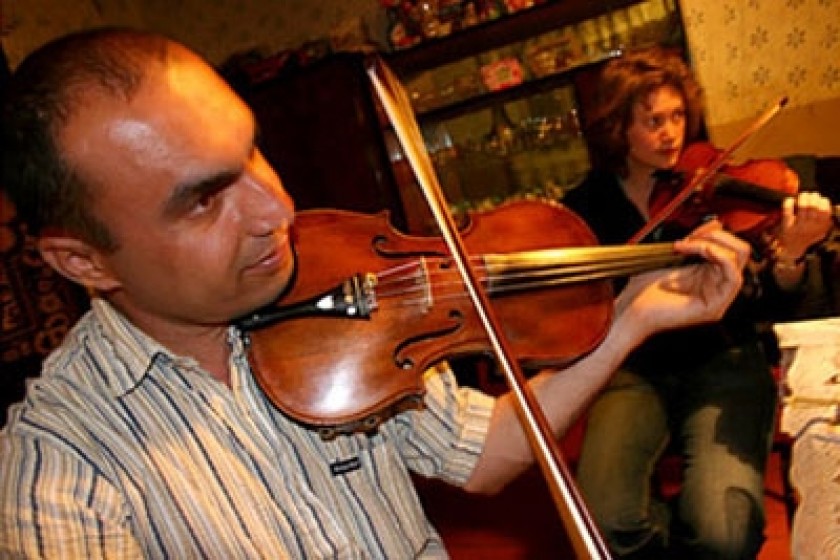
Music of a Confused Society
From the top of the mountain, Alagyaz looks like one of Van Gogh's paintings of Arles. The houses are colorful but not bright. Only the houses on the edge are visible.
I am trying to find the old singer's house, which we visited just before climbing the mountain. The house with its earthen floor has three rooms. The main room with a tonir (a pit for baking lavash, Armenian flat bread), the shed on the right side, and the living room on the left side.
I met the singer earlier, hearing him sing sitting on a small chair with turkeys and chickens around his feet. The singer is 78 but neither his face, with only a few small wrinkles, nor his clear voice betray his age.
All his songs are long monotone love songs. But the monotonousness is not boring. From time to time his son and a boy I believe is his grandson joined him.
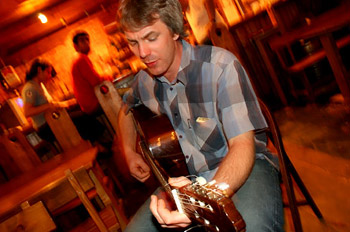 |
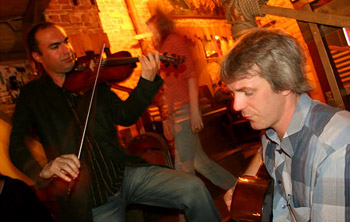 |
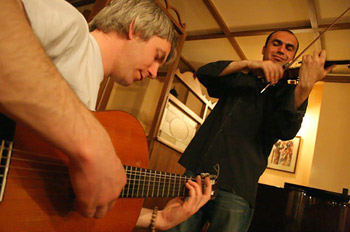 |
 |
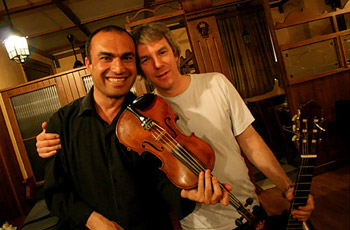 |
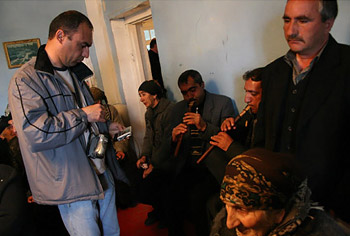 |
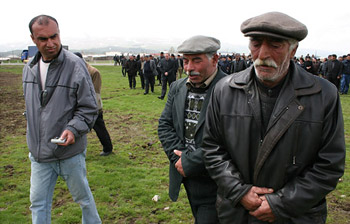 |
Once Nahro said, "Khachatur Abovyan said every Kurdish woman is a singer." I would generalize the saying like this: every Kurd is a singer, at least in this village.
Alagyaz is one of the villages Nahro chose for his research on Kurdishmuzik ajamanti - the people's music.
Nahro Zagros is an ethnomusicologist. A Kurd by nationality, he was born in Iraqi Kurdistan.
Several years ago, as a refugee, he moved to Great Britain where he has lived until now. His research is a part of his MPhil PhD at the University of York.
We are to spend a full day in Alagyaz. So before moving to other houses to record songs, we decide to climb one of the smaller of the high mountains surrounding the village.
On the top of the mountain there are still thick layers of snow; snow flowers are everywhere.
"I should have brought my violin," Nahro says, "Imagine what sound I would get in this echo."
Nahro plays wonderfully and I also regret its absence.
The first time I asked him to play Kurdish national music he laughed and said, "First, promise not to shout at me?"
"Why should I?"
"Kurdish music is pretty much like Armenian music. When Armenians hear Kurds play their national music they say it's ours, you've taken it from us! It's the same is when Kurds hear Armenians play."
"Why did you choose Armenia for your research?"
"Well, there are a few reasons. As a child I used to listen to Radio Yerevan where Kurds had one-and-a-half hours of programs. Through that music I became interested in the Kurmanji language (a Kurdish dialect spoken by the Yezidies living in Armenia).
National spirit is always reflected in culture, particularly, in music. For the Kurds living in the Soviet Union, Armenia was always the best place in terms of both freedom and preservation of their national identity and culture. Following the collapse of the Soviet Union, Armenia has undergone big changes, which have had their impact on the ethnic minorities living in Armenia. Facing high unemployment many Kurds left Armenia, immigrating mainly to Russia. The widespread conversion to Jehovah's Witnesses and other Christian religions has not passed by the Kurds living here either.
The biggest issue in Armenia regarding the Kurds is the problem of identity; are the Yezidi classified as Kurds or not?
"What interests me is, where is the place of music in this confused society? Konstantin Orbelyan said, 'Every Kurdish tribe has richer musical traditions than perhaps the largest nation.' Did they manage to preserve those traditions under so many changes?"
"What impact has that division into two nations - Kurds and Yezidi-had on music?"
"Instead of an hour and a half, now Armenian Radio gives a half an hour to the Kurds and another half an hour to the Yezidis, claiming they are not Kurds. As for the music, they don't record any new stuff; they use the same archives, but the Yezidies have less choice because they avoid using the patriotic songs with the word Kurdistan in them. The rest is the same."
"And were you familiar with Armenian music before coming here?"
"Pretty much, again through Radio Yerevan. My favorite Armenian composer was Aram Khachaturyan. I knew that there was his museum in Armenia and dreamed of seeing it. That dream seemed to be so far, so unreal, that when I entered the museum I had tears in my eyes.
"I was also familiar with Komitas's art. He was one of the first researchers on Kurdish music. In 1904 in Moscow his book Kurdish Melodies was published. There are 13 melodies in the book but I believe there were more than just those 13 preserved. I liked Komitas so much that I began to learn his other works as well."
"What are the main similarities between Armenian and Kurdish music?"
"The music of these two nations has been linked since long ago. The best Kurdish singer in Armenia, Karapete Khajo, was Armenian. He died last year, 104 years old. Another very famous Kurdish singer, Arame Tigran, now living in Europe, is also Armenian.
"Kurdish and Armenian music is similar in melodic structure (for example repeated chords), lyrics, instruments. The Kurds living in Turkey have the dhol, duduk. Iranian Kurds play the tar. The Kurmanji Kurds' music is the closest to Armenian music.
Generally, Kurdish songs are of six main types:
Chelamen merani - patriotic and war songs, mainly about the fight against the Ottoman Empire. These songs usually have a hero and the whole song tells of his bravery and feats. The most prominent hero of these songs is Jahangir Agha from Alagyaz.
Chelamen ben giti - love songs, usually dialogs between a man and a woman or a song by a woman devoted to her husband killed in war.
Chelamen shini - improvisational songs by women at funerals.
Chelamen dilana - dances and wedding songs.
Chelamen diruchi - historical songs.
Chaul - songs sung by sheikhs and nobles at religious ceremonies, weddings and funerals.
"Similarities are also visible in the classification of songs.
"Kurdish culture and tradition seems not to have been properly researched in Armenia."
"As I already mentioned, Kurdish society in Armenia is confused regarding its identity. If I go to some Kurdish village and say I am a Kurd from Iraq, they will say, we are Kurds. If I say I am working for the Armenian government and believe Yezidis are not Kurds, they will say yes, you're right, we are a different nation.
"Armenians are also confused about this issue. There is little deep research being done. When foreign scholars come to Armenia to do research, they usually stay in expensive hotels, visit Kurdish villages just for a few hours, and then go back and write about it. Armenian scholars normally have their own opinion on the issue and do not communicate with the Kurds. Lack of knowledge creates prejudice towards each other.
"Also, the Kurds living in Armenia are almost completely unaware of their culture and religion. For instance, they say we are Kurds by nationality and Yezidis by religion. But there is no such word, Yezidi. The religion is called az dai , which means "God created me." With time az dai became ezidi , so the right word is not yezidi but ezidi .
"Kurdish culture is oral culture. So there is always a danger of losing it, especially in such a confused society.
"I recorded a huge number of songs in different villages. I don't know yet what I'll do with all of them but think it is important to have them preserved somewhere."
Photos by Onnik Krikorian
 Videos
Videos Photos
Photos
Write a comment